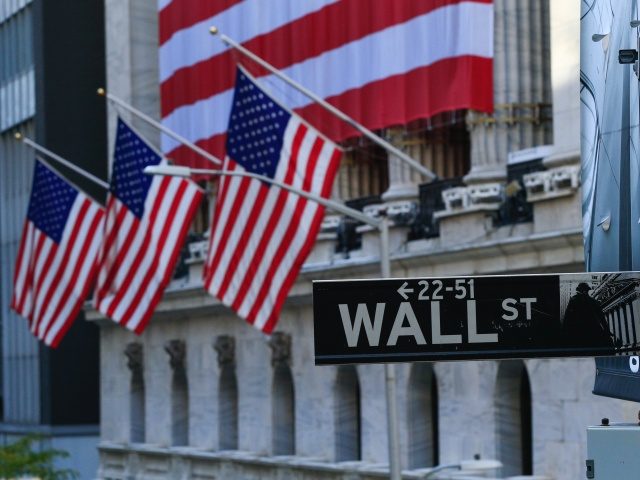Investors recoiled from stocks on Tuesday, selling off energy and consumer finance shares and taking technology equities for a wild ride.
The Dow Jones Industrial Average fell nearly 474 points, a 1.36 percent decline. The S&P 500 fell by nearly nine-tenths of a percentage point. The Nasdaq Composite fell began the day with a lurch downward by almost 2 percent only to reverse and end the day nearly flat.
Ten of the 11 sectors of the S&P fell. The energy sector, down by 2.56 percent, was the worst-performing sector. The financial fell 1.67 percent, with consumer finance stocks—such as credit card companies—falling 2.42 percent.
The biggest decliners on the Dow were Home Depot, Travellers, American Express, Chevron, and Goldman Sachs. The only gainers were Honeywell, Salesforce, and Nike.
Any significant acceleration of inflation would be a drag on the overall market and could crimp the broader economic recovery if it forced the Fed to raise rates or convinced Congress to tighten fiscal policy.
Commodity prices have risen, particularly for industrial metals such as copper and platinum, as well as for energy commodities like gasoline and crude oil. Tech stocks, which get most of their valuation from the future profits those companies are expected to earn, become less valuable if inflation decreases the value of those earnings. Shares of Microsoft and Apple fell but shares of Amazon, Twitter, Facebook, and Netflix were up.
Inflation has been a concern for investors since bond yields spiked earlier this year, though yields have mostly stabilized since then. The yield on the 10-year Treasury was steady at 1.62 percent. Despite reassurances from the Federal Reserve and a much weaker-than-expected U.S. jobs reading last week, investors have refocused on the potential for surging prices to pressure central banks into tapering off on their massive stimulus and ultra-low interest rates, analysts said.
The market is going through a period of “digestion” as the economy recovers and is due for some consolidation following a strong run, said Sunitha Thomas, national portfolio advisor at Northern Trust Wealth Management. Rising inflation isn’t unusual given the strong economic recovery along with a surge in company earnings, she said.
Rising inflation in commodities has begun to push prices for some consumer products higher. Still, analysts expect increases to be mild and tied to the growing economy, even as the jobs market lags behind. Consumer confidence and retail sales are regaining ground as people get vaccinated and businesses reopen.
Signals of inflation have popped up in other markets. China reported its strongest increase in producer prices since October 2017 last month, as supply constraints cascaded into manufacturing.
Meanwhile, the most recent round of corporate earnings reports showed a broad recovery touching many different sectors and industries during the the first three months of the year. Much of that was anticipated ahead of the reports and investors are now far off from the next big round of results.
–The Associated Press contributed to this report.

COMMENTS
Please let us know if you're having issues with commenting.